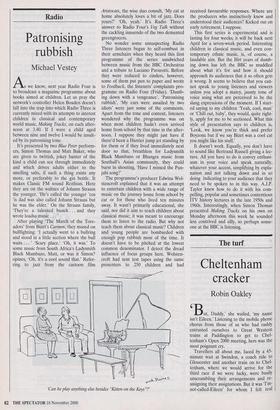Radio
Patronising rubbish
Michael Vestey
A1s we know, next year Radio Four is to broadcast a magazine programme about books aimed at children, Let us pray the network's controller Helen Boaden doesn't fall into the trap into which Radio Three is currently mired with its attempts to interest children in classical and contemporary world music, Making Tracks, on each after- noon at 3.40. If I were a child aged between nine and twelve I would be insult- ed by its patronising tone.
It's presented by two Blue Peter perform- ers, Simon Thomas and Matt Baker, who are given to twittish, jokey banter of the kind a child can see through immediately and which drives adults either to the smelling salts, if such a thing exists any more, or preferably to the gin bottle. It makes Classic FM sound Reithian. Here they are on the waltzes of Johann Strauss the younger, 'He's called the younger 'cos 'is dad was also called Johann Strauss but he was the elder.' On the Strauss family, `They're a talented bunch . . . and they wrote loadsa music . . . '
After playing 'The March of the Tore- adors' from Bizet's Carmen, they mused on bullfighting: 'I actually went to a bullring and stood in a little section where the bull waits . . . "Scary place."Oh, it was.' To some music from South Africa's Ladysmith Black Mambazo, Matt, or was it Simon? opines, 'Oh, it's a cool sound that.' Refer- ring to jazz from the cartoon film Aristocats, the wise duo consult, 'My cat at home absolutely loves a bit of jazz. Does yours?"Oh, yeah.' It's Radio Three's answer to Radio Four's Veg Talk without the cackling innuendo of the two demented greengrocers.
No wonder some unsuspecting Radio Three listeners began to self-combust in their armchairs when they heard this first programme of the series sandwiched between music from the BBC Orchestras and a tribute to Luciano Pavarotti. Before they were reduced to cinders, however, some of them put pen to paper and wrote to Feedback, the listeners' complaints pro- gramme on Radio Four (Friday). 'Dumb- ing down with a vengeance', Patronising rubbish', 'My ears were assailed by two idiots' were just some of the comments. Apart from the tone and content, listeners wondered why the programme was on when most children hadn't even arrived home from school by that time in the after- noon. I suppose they might just have if there'd been a Harrier jump jet standing by for them or if they lived immediately next door so that, breathless for Ladysmith Black Mambazo or Bhangra music from Southall's Asian community, they could burst in shouting, 'Have I missed the Pun- jabi song?'
The programme's producer Edwina Wol- stencroft explained that it was an attempt to entertain children with a wide range of music on the journey home from school by car or for those who lived ten minutes away. It wasn't primarily educational, she said, nor did it aim to teach children about classical music; it was meant to encourage them to listen to the radio. But why not teach them about classical music? Children and young people are bombarded with enough pop rubbish most of the time. It doesn't have to be pitched at the lowest common denominator. I detect the dread influence of focus groups here. Wolsten- croft had sent test tapes using the same presenters to 250 children and had `Can he play anything else besides "Kitten on the Keys"?' received favourable responses. Where are the producers who instinctively knew and understood their audiences? Kicked out on early retirement, I suppose.
This first series is experimental and is lasting for four weeks; it will be back next April for a seven-week period. Interesting children in classical music, and even con- temporary ethnic music, is, of course, a laudable aim. But the Birt years of dumb- ing down has left the BBC so muddled about what it's for and how it should approach its audiences that it so often gets it wrong. It seems to believe that you can- not speak to young listeners and viewers unless you adopt a matey, jaunty tone of voice using what are perceived to be the slang expressions of the moment. If I start- ed saying to my children 'Yeah, cool, man' or 'Chill out, baby', they would, quite right- ly, apply for me to be sectioned. What this style of presentation says to children is, `Look, we know you're thick and prefer Boyzone but if we say Bizet was a cool cat you might like his stuff.'
It doesn't work. Equally, you don't have to sound like Bertrand Russell giving a lec- ture. All you have to do is convey enthusi- asm in your voice and speak naturally, whatever your accent, simplifying by expla- nation and not talking down and in so doing indicating to your audience that they need to be spoken to in this way. A.J.P. Taylor knew how to do it with his com- pelling, popular and sometimes contentious ITV history lectures in the late 1950s and 1960s. Interestingly, when Simon Thomas presented Making Tracks on his own on Monday afternoon this week he sounded less contrived and silly, so perhaps some- one at the BBC is listening.


































































































 Previous page
Previous page